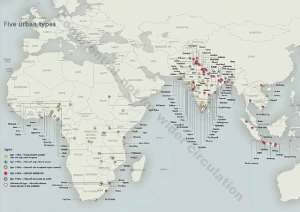
A major new report 'Future Proofing Cities' has been published by Atkins in a unique partnership with the Department for International Development (DFID) and University College London (UCL) assesses the risks to cities from climate hazards, resource scarcities, and damage to ecosystems and how they can act now to future proof themselves. Covering 129 cities totalling 350 million people in 20 countries, this report identifies practical measures that cities can take to manage these future risks.
Around 75% of the world's population will live in cities within 40 years. Almost all of this population growth will happen in the developing world, with 4.6 billion people projected to live in already rapidly growing cities.
How will these cities in the developing world cope socially, environmentally and economically with such accelerated urbanisation?
Future Proofing Cities assesses the risks from mega cities like Bangkok to smaller cities such as Accra in Ghana. It looks at their risk profile from climate hazards, resource scarcities, and damage to ecosystems and urges action now to future proof against these risks.
This report provides a fresh approach to the urgent issues arising from rapid urbanisation. It assesses the environmental risks facing cities in an integrated way and identifies more than 100 practical policy options that are most relevant and will be of most benefit to people living in different types of cities.
It builds on the collective work on urbanisation by DFID, Atkins and UCL with forewords by the World Bank and Rockefeller Foundation.
The report is set against a growing awareness of the need for increased funding for infrastructure development in developing countries at the city level.
This report provides an early warning for people living and working in these cities, while providing market intelligence for investors.
In her Foreword to the report, Secretary of State, Justine Greening, said:
“We have now crossed the threshold where more than half of the world's people live in urban areas, and urbanisation is continuing at a terrific pace. This will provide exciting new economic opportunities for many poor people. But cities face multiple environmental risks and many will be vulnerable to the impact of climate change. The cities that flourish will be those that tackle these challenges, in an integrated way, as they grow - rather than waiting until it is too late or too costly to do so.”
Atkins' UK Chief Executive Officer David Tonkin commented:
“The earlier cities take steps to future proof themselves the better. As this report demonstrates, these are complex challenges which require deep technical skills brought together to understand the scale and urgency of the risks that cities face. Through our broad experience of working in cities around the world and our ability to integrate a range of disciplines we understand both the complexity and the opportunities that can be created. It is not easy, but it is important that all those who live, work and invest in cities come together and shape solutions for their future.”
Professor David Price, UCL Vice-Provost (Research), said:
"The report reveals significant gaps in our data, knowledge and evidence, highlighting the need for high quality research on the governance of urban environmental risks and the enrolment of multiple actors in planning and decision-making. Yet the report also speaks to the amount of positive change that it is within our grasp to bring about more sustainable, fairer and safer cities in less developed countries. This kind of change will be better achieved through the effective engagement of international development agencies with academics, policymakers, practitioners and citizens."




 Avoid pre-registered SIMs, buyer and seller liable for prosecution – Ursula Owus...
Avoid pre-registered SIMs, buyer and seller liable for prosecution – Ursula Owus...
 Election 2024: Mahama has nothing new to offer Ghanaians, Bawumia is the future ...
Election 2024: Mahama has nothing new to offer Ghanaians, Bawumia is the future ...
 OSP files fresh charges against ex- PPA Boss
OSP files fresh charges against ex- PPA Boss
 Withdraw unreasonable GH¢5.8m fine against former board members – ECG tells PURC
Withdraw unreasonable GH¢5.8m fine against former board members – ECG tells PURC
 Akroma mine attack: Over 20 armed robbers injure workers, steal gold at Esaase
Akroma mine attack: Over 20 armed robbers injure workers, steal gold at Esaase
 Those who understand me have embraced hope for the future — Cheddar
Those who understand me have embraced hope for the future — Cheddar
 Ghana will make maiden voyage into space should Bawumia become President — Chair...
Ghana will make maiden voyage into space should Bawumia become President — Chair...
 Train crash: Despite the sabotage, we shall not be deterred and will persevere —...
Train crash: Despite the sabotage, we shall not be deterred and will persevere —...
 Tema-Mpakadan railway project a perversion of the original viable concept design...
Tema-Mpakadan railway project a perversion of the original viable concept design...
 Train crash: Elsewhere, everyone involved in the test will either be fired or re...
Train crash: Elsewhere, everyone involved in the test will either be fired or re...
